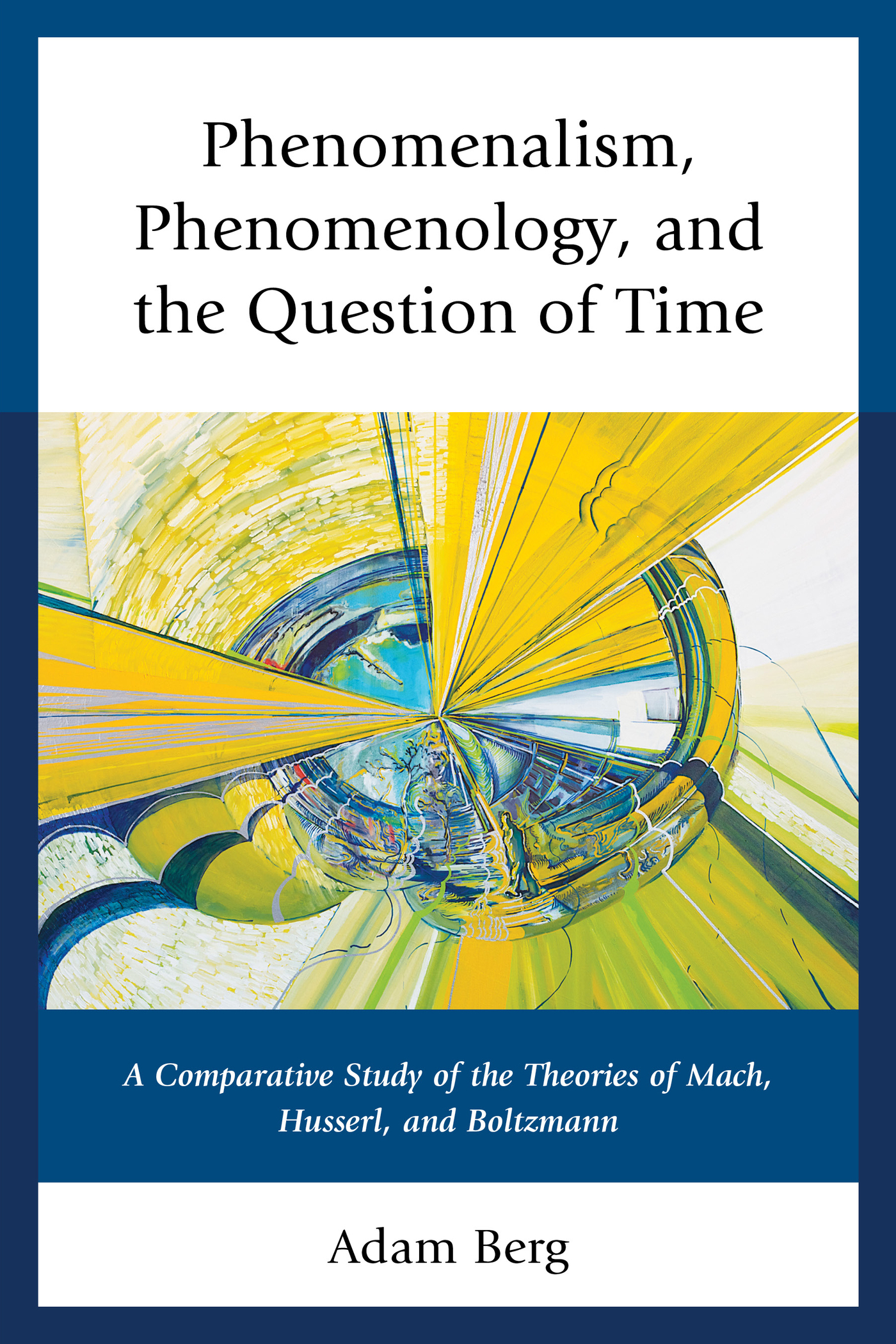Phenomenalism, Phenomenology, and the Question of Time
Phenomenalism, Phenomenology, and the Question of Time
A Comparative Study of the Theories of Mach, Husserl, and Boltzmann
By Adam Berg
LEXINGTON BOOKS
Lanham Boulder New York London
Published by Lexington Books
An imprint of The Rowman & Littlefield Publishing Group, Inc.
4501 Forbes Boulevard, Suite 200, Lanham, Maryland 20706
www.rowman.com
Unit A, Whitacre Mews, 26-34 Stannary Street, London SE11 4AB
Copyright 2016 by Lexington Books
All rights reserved. No part of this book may be reproduced in any form or by any electronic or mechanical means, including information storage and retrieval systems, without written permission from the publisher, except by a reviewer who may quote passages in a review.
British Library Cataloguing in Publication Information Available
Library of Congress Cataloging-in-Publication Data
Berg, Adam, 1962
Phenomenalism, phenomenology, and the question of time : a comparative study of the theories of Mach, Husserl, and Boltzmann / Adam Berg.
p. cm.
Includes bibliographical references and index.
ISBN 978-1-4985-0372-3 (cloth : alk. paper) ISBN 978-1-4985-0373-0 (ebook)
1. Phenomenology. 2. Time. 3. Mach, Ernst, 1838-1916. 4. Husserl, Edmund, 1859-1938. 5. Boltzmann, Ludwig, 1844-1906. I. Title.
B829.5.B47 2016
142'.7dc23
2015035410
 TM The paper used in this publication meets the minimum requirements of American National Standard for Information Sciences Permanence of Paper for Printed Library Materials, ANSI/NISO Z39.48-1992.
TM The paper used in this publication meets the minimum requirements of American National Standard for Information Sciences Permanence of Paper for Printed Library Materials, ANSI/NISO Z39.48-1992.
Printed in the United States of America
The temporal order is even more important than the spatial. Reversal of the temporal order is even more destructive of a process than is the reversal of an object in space by turning it upside down; reverse the temporal order, and an experience becomes something other than itself, something quite new.Ernst Mach, The Analysis of Sensations and the Relation of the Physical To the Psychical
Acknowledgments
I would like to thank the Open Court Publishing Company for giving me permission to use a citation from Ernst Machs The Analysis of Sensations and the Relation of the Physical To the Psychical (1914) as the books epigraph.
I wish to thank Lexingtons Jana Hodges-Kluck for helping me during the editing process and also Rachel Weydert for assisting me with the final stages of the books preparation and production.
I would like to thank Giora Hon for encouraging and supporting me in my research on phenomenalisms relation to phenomenology and philosophy of time. I would also like to acknowledge and thank the department of philosophy and the Haifa University which awarded me a Beller Prize for outstanding PhD dissertation in the history and philosophy of science, Israel Society for History & Philosophy of Science following the completion of my studies.
Special thanks to Brunella Antomarini for her friendship and support. My gratitude is extended to my friends, colleagues, and students from the LAS department at Otis College of Art and Design and the Critical Studies department at Cal Arts and also to Yoram Carmeli, Emma Kemp, David Charles, Shaye Remba, Edward Cella, Renee Harwick, Paul Bouissac, and Martin Stiglio.
Finally, and most importantly, this book could not have been possible without the love and support of my family. To my parents, my sister, and brother. My thanks to the Jaffe family. To my inquisitive daughters Liv and Mica. And to Erith whose comments and support made this book possible.
Introduction
Examining Phenomenalism and Phenomenology in Relation to Time and Irreversibility
Phenomenalism, Phenomenology, and the Question of Time seeks to address Husserls phenomenology in a new way that offers a view into debates in the philosophy of science and time as well as Husserls own theory of time in relation to Machs phenomenalism. By examining Machs and Boltzmanns conceptions of time in relation to Husserls I would like to draw attention to the significance of Husserls phenomenology to the philosophy and physics of time and elucidate aspects in Husserls philosophy that are important not only to the scope of his phenomenology and critique of science but to our ability of naturalizing phenomenology and time. In fact, my focus is not Husserls critique of science as associated primarily with his later work, such as in his book The Crisis of European Sciences and Transcendental Phenomenology. Rather, my attention is mostly given to Husserls concepts in mathematics and kinesthetics pertaining to the analysis of time and continuity in relation to perception.
The philosophical motivation for this book is a critique of conceptions of temporal irreversibility as phenomenologically grounded and as lying outside the perimeters of science. Such an undertaking necessitates examining the historical context that is rich in cross-influences between the philosophical and scientific discourses. Phenomenalism and phenomenology as emerged at the end of the nineteenth century and the beginning of the twentieth shared a common context and were related to the formulations of thermodynamics by Ludwig Boltzmann (18441906). If discussions of such historico-philosophical contexts relegate Ernst Mach (18381916) to phenomenalism on the one hand, and Edmund Husserl (18591938) to phenomenology on the other, they fall short in grasping both the connections and complexity of the context. There is thus a need to address Mach and Husserl and to re-examine the concepts of time and irreversibility in relation to the work of Ludwig Boltzmann (18441906).
How we trace the genealogy of questions regarding the experience of time and its irreversible manifestations in human perception is largely connected to discussions in philosophy and science that differentiate perceptual and mathematical constructs of time. In particular, these questions are connected to the difficulty in disentangling a plexus of influences and discursive contexts which rose in the nineteenth and twentieth century and involved three main figures which are the foci of my book: Boltzmann, Mach, and Husserl. I will comparatively analyze conceptions of time in relation to Boltzmanns thermodynamics and statistical mechanics, as well as in philosophy, with the specific historical context of Machs phenomenalism and Husserls phenomenology and will reassess how we define and articulate the problem of irreversibility in relation to time.
The problem of irreversibility in relation to time can be understood in two principle ways. The first in connection with the apparent contradiction between scientific descriptions of time-symmetry in physics and biological and thermodynamical processes which are time-asymmetric. The second arises when we attempt to account for experiential and phenomenological perception of temporality which place time in subjectivity in contrast to the ontological objectivity of time. More familiar are Machs and Bergsons respective critiques of the physics of time-symmetry; Machs (as will be discussed in the book) in respect to the sensation of time, and Bergsons in his rejection of metric time as opposed to the intuition of time as durational. Husserls on-going probing of time and temporality, of what he regarded as objective time and internal time-consciousness are less known within the context of the philosophical and scientific debate on time and the problem of irreversibility. Nonetheless, my focus in this book is not given primarily to Husserls conception of temporality and its exclusive significance to phenomenology. Rather, by comparatively analyzing some phenomenal roots and influence in Husserls thinking I intend to elaborate on some key issues in the philosophy of time and questions connected to irreversibility and unidirectionality of time. Husserls developing of his phenomenology of internal time consciousness defines a nexus between consciousness and temporality, and such nexus is crucial to the understanding of the connection between intentionality and temporal objects.
Next page
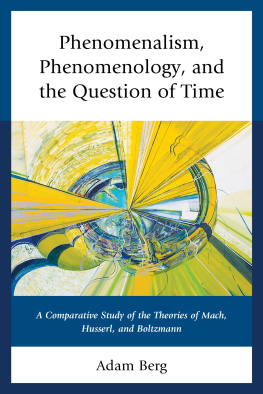
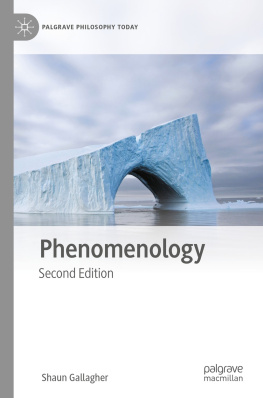

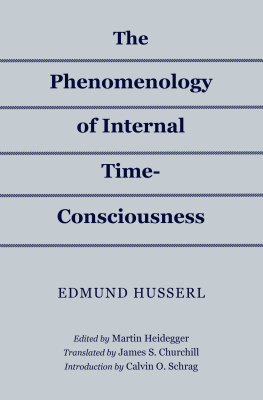
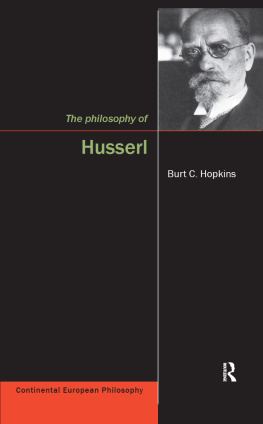
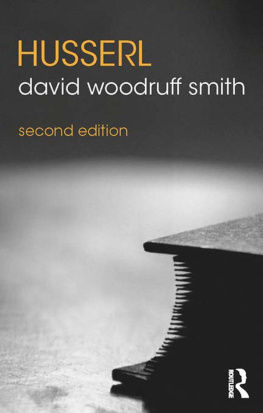
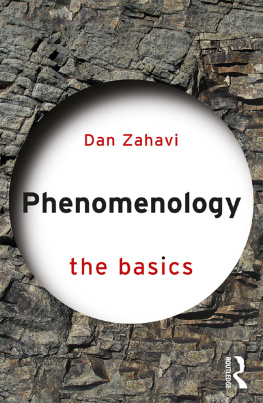

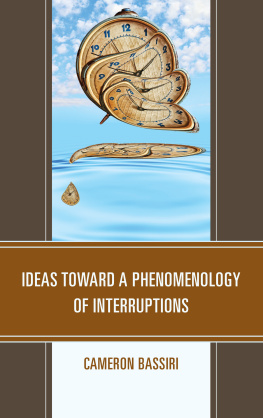
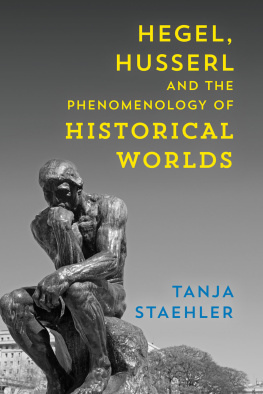
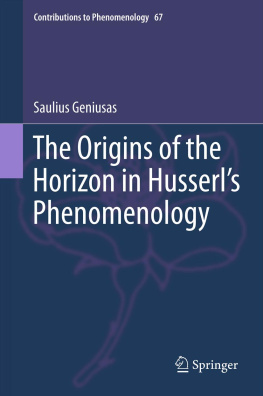
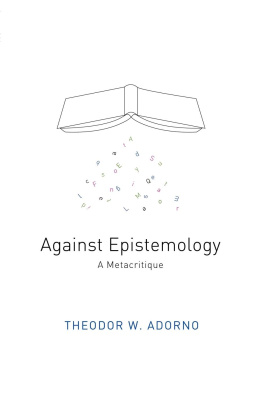

 TM The paper used in this publication meets the minimum requirements of American National Standard for Information Sciences Permanence of Paper for Printed Library Materials, ANSI/NISO Z39.48-1992.
TM The paper used in this publication meets the minimum requirements of American National Standard for Information Sciences Permanence of Paper for Printed Library Materials, ANSI/NISO Z39.48-1992.